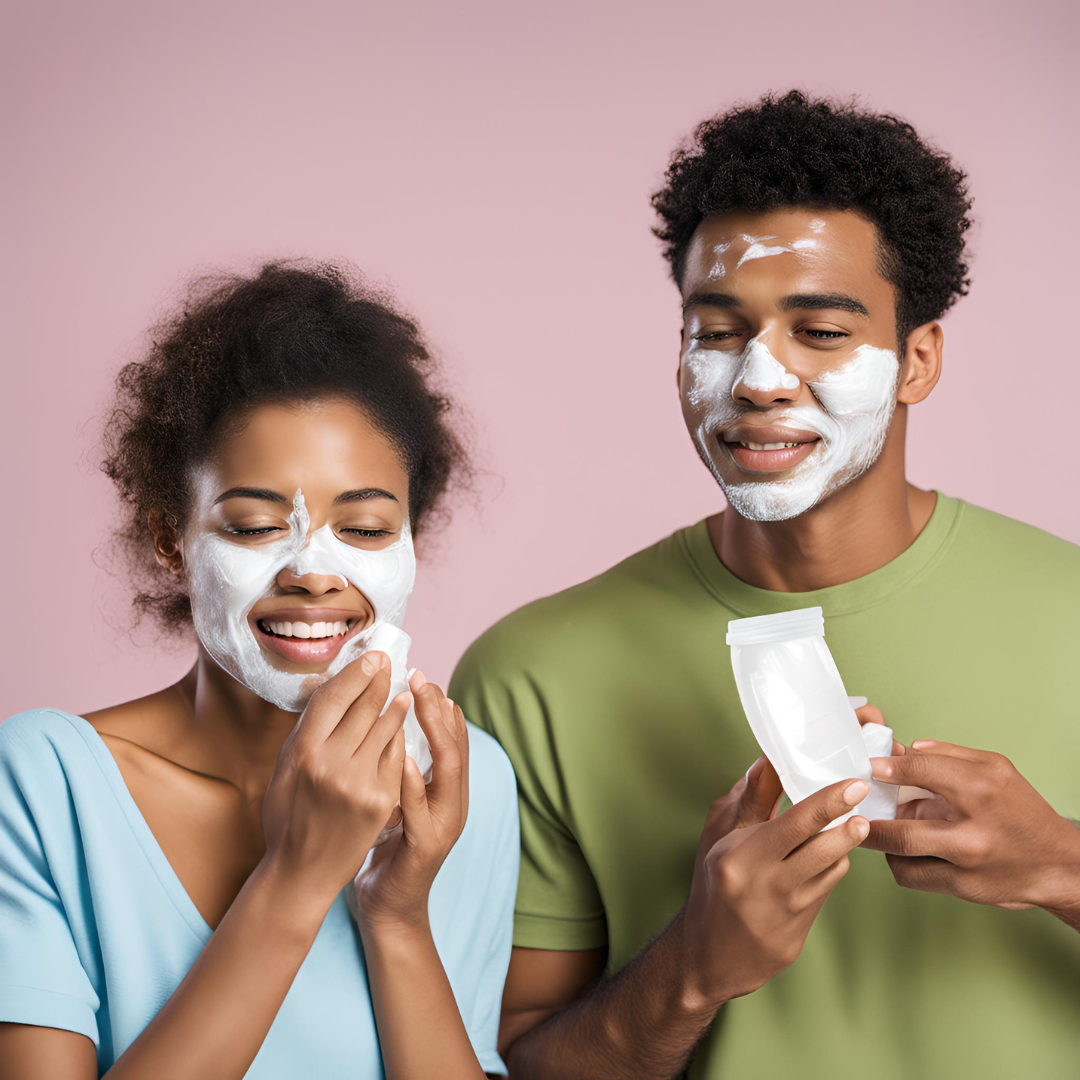It doesn’t matter who you are, your skin changes as you age. That’s natural, and that’s ok. There are several reasons for skin to get thinner, develop wrinkles and spots: Environmental factors, lifestyle choices, and natural aging processes all influence these changes.
What’s cool is that more and more men are finally comfortable and interested in creating a skincare regime to battle those aging-related changes. It’s not necessarily about looking good, or being vain, for a lot of guys it’s just about looking healthy.
They workout, they pay attention to what they eat, and now it’s time to give that kind of care to their faces.
What are Signs of Aging in Men’s Skin?
- One of the most noticeable signs of aging is the appearance of fine lines and wrinkles. Factors like sun exposure and smoking can accelerate their development. These often start to appear around the eyes (crow's feet), forehead, and mouth.
- Over time, the skin loses collagen and elastin, decreasing firmness and elasticity. This can result in sagging skin, particularly around the jawline and neck.
- Aging skin tends to produce less oil, leading to increased dryness and a rougher skin texture. This change can make the skin appear dull and accentuate existing lines and wrinkles.
- Prolonged sun exposure can cause age spots, also known as liver spots and uneven skin tone. These spots typically appear on areas frequently exposed to the sun, like the face, hands, and arms.
As we age, our skin naturally becomes thinner and more delicate, making it more susceptible to damage and less able to retain moisture. While it's impossible to stop aging, the right skincare strategy can significantly slow its visible signs and maintain your skin’s health.
Daily Skincare Routine - The Best Men's Anti-Aging Routine
Understanding how to adjust your daily skincare routine is key to catering to the evolving needs of aging skin. The key to an effective skincare routine for aging skin is to focus on hydration, protection, and targeted treatments.
Let's dive into some practical adjustments that can make a big difference:
Hydration: What-to-do Basics
- The first step in a hydrating routine is to use a gentle cleanser. This helps maintain the skin's natural moisture barrier.
So, start with a gentle cleanser to avoid harsh, soap-based cleansers, which can strip away the skin of its natural oils and exacerbate dryness and sensitivity common in aging skin.
- As skin ages, its natural ability to retain moisture diminishes. A quality moisturizer becomes crucial, and moisturizing becomes even more crucial.
Opt for deeper hydration products that contain anti-aging ingredients like retinol, peptides, or antioxidants, such as vitamins C and E.
Protection: Sun Protection is Non-Negotiable
The sun isn't just about warmth and vitamin D. Its UV rays profoundly impact your skin, accelerating aging and increasing the risk of skin cancer.
These rays can penetrate clouds and windows, meaning your skin needs protection even on overcast days and indoors.
Not all sunscreens are created equal. Opt for broad-spectrum products that guard against UVA and UVB rays for effective protection. An SPF of 30 or higher is ideal for everyday use, and if you're outdoors frequently, consider a water-resistant, higher SPF formula.
Apply sunscreen generously and evenly to all exposed areas of your skin, not just your face. Many men forget about their necks, ears, and the backs of their hands, but these areas need protection, too.
Addressing Past Exposure
If signs of aging from sun exposure are already present, it’s not too late to act. Products with AHAs, vitamin C, and other rejuvenating ingredients can help mitigate past damage and improve your skin's appearance.
Targeted treatments
- Night creams with thicker textures can provide extra nourishment.
- Look for eye creams with ingredients like caffeine, known for reducing puffiness, and niacinamide or vitamin K for diminishing dark circles. Hyaluronic acid and peptides can help smooth fine lines and firm the skin around the eyes.
- Introduce serums or treatments that target specific aging concerns.
- Products containing retinoids or vitamin C are beneficial for fine lines and wrinkles.
- Consider serums with niacinamide or AHAs for age spots and uneven skin tone.
- The skin around the eyes is delicate and often shows aging signs first. Adding an eye cream to your routine can help address issues like crow’s feet and under-eye bags.
Extra: Regular Exfoliation
Exfoliation is another crucial component in any anti-aging skincare routine, especially for men. It’s not just about sloughing off dead skin cells; it’s about rejuvenating your skin and promoting a healthier, more youthful complexion.
Here’s why regular exfoliation should be a staple in your skincare regimen:
- Understanding Exfoliation:
Exfoliation refers to the process of removing dead skin cells from the surface of your skin.
- This helps prevent clogged pores and acne and enhances skin renewal, crucial for maintaining a youthful look.
- Types of Exfoliants:
There are two main types of exfoliants: physical and chemical.
- Physical exfoliants use a textured substance to manually remove dead cells, while chemical exfoliants, such as AHAs (alpha hydroxy acids) and BHAs (beta hydroxy acids), dissolve the bonds between skin cells to promote natural exfoliation.
- Benefits of Regular Exfoliation:
Regular exfoliation can improve skin texture, reduce the appearance of fine lines, and even out skin tone.
- It also enhances the effectiveness of other skincare products by allowing better absorption into the skin.
- Choosing the Right Exfoliant:
For aging skin, gentle exfoliation is key. Opt for mild chemical exfoliants like lactic acid or low-concentration glycolic acid.
- These ingredients offer effective exfoliation without the harshness of physical scrubs, which can damage mature skin.
- How Often Should You Exfoliate?
The golden rule is moderation. Over-exfoliation can lead to irritation and damage the skin barrier.
- Generally, exfoliating 1-2 times per week is sufficient for most men, but this can vary based on your skin type and sensitivity.
Understanding Key Ingredients in Men's Skincare
When fighting the signs of aging in men’s skincare, the ingredients in your products can make all the difference. Here are some powerhouse ingredients that are proven to be effective in anti-aging and should be on your radar:
Retinoids (Retinol): They are vitamin A derivatives renowned for reducing the appearance of fine lines and wrinkles. They work by boosting collagen production and speeding up cell turnover.
- Start with a lower concentration and gradually increase to allow your skin to adjust.
Peptides: Small chains of amino acids that help build proteins like collagen in the skin. They are known for improving skin texture and firmness, making them a key ingredient in many anti-aging products.
Antioxidants: Vitamin C, E, and niacinamide fight against environmental damage and reduce signs of aging. Vitamin C, in particular, is effective in brightening the skin and reducing the appearance of age spots.
Hyaluronic Acid: Hyaluronic acid is a powerful humectant that can hold up to 1000 times its weight in water. It helps keep the skin hydrated and plump, reducing the visibility of fine lines and wrinkles.
Alpha Hydroxy Acids (AHAs): Glycolic acid and lactic acid are used for chemical exfoliation. They help in removing dead skin cells, revealing brighter, younger-looking skin.
- They also assist in improving skin texture and reducing the appearance of age spots.
How Can Man Make His Face Look Younger?
Aging is a natural process; embracing it doesn’t mean neglecting your skin.
It’s about adapting your skincare routine to meet the evolving needs of your skin, ensuring it remains healthy and vibrant.
The steps we've outlined – gentle cleansing, focused hydration, regular exfoliation, diligent sun protection, and choosing the right anti-aging ingredients – are your tools for maintaining a youthful and resilient complexion.
As you incorporate these practices into your daily life, remember that consistency is key. Skincare is not a sprint; it's a marathon. Small, regular steps can lead to significant changes over time.


